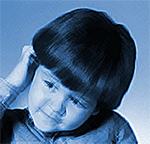Healing Little Hearts: Helping Kids Grieve
Whether they’re dealing with the death of a family member or of a beloved pet, kids can and do feel the loss as deeply as adults. Parents, though, often don’t know how to help their children grieve.
In fact, by pushing to “make it better,” or by urging their kids to “just smile,” moms and dads can actually do harm, says Julie Stanick, MEd, coordinator for the Horizons Children’s Loss Program in Florida.
“If [the grief process] is stifled, if it is suppressed, it will come out five, six, seven years later,” possibly through behaviors such as the use of drugs or alcohol, she says.
Although grief is an individual journey, adults can help children in the following ways:
Let Kids Grieve Like Kids
Kids and adults grieve differently, says Angela Hamblen, CMSW, bereavement specialist with Baptist Trinity Hospice inMemphis, which sponsors Camp Good Grief, a children’s bereavement program.
“Children do their grieving in spurts. They can only tolerate and handle the intensity [of their feelings] for a short period of time,” Hamblen says. As a result, kids may swing from playfulness to despair in a matter of minutes. Give them room for their full range of feelings.
Be Supportive, Yet Non-intrusive
 While it’s important to let children know you’re available, do it in a way that lets them be in control of when and how they share their feelings.
While it’s important to let children know you’re available, do it in a way that lets them be in control of when and how they share their feelings.
“Follow the child’s lead,” suggests Linda Goldman, grief therapist, educator and author of several books on grieving, including Life and Loss: A Guide to Help Grieving Children.
Help Kids Identify Their Emotions
Because of their limited experience with grief, children may not even have the vocabulary to convey their many emotions, including sadness, anger, fear, and helplessness. Goldman says one of the most helpful things an adult can do is to give names to what the child is feeling.
Give Age-Appropriate Information
What you tell a preschooler about her grandmother’s death is likely to be different from what you share with a teenager. But whatever you do, “Tell the truth at all times,” recommends John McLoughlin, support service assistant for Stella Maris Hospice inMaryland.
Look for External Support Systems
Contact your child’s school, a local hospice, religious institution, or university for referrals to children’s programs. Your pediatrician can also advise you on how to share appropriate information with your child.
Expect Your Child to Regress
Kids, especially younger ones, can experience developmental setbacks, so don’t be surprised if your child goes back to thumb sucking or bedwetting, says Hamblen. Extra attention can help your child feel more secure.
Be Aware of Danger Signs
While sleeplessness, anxiety, sadness, and lack of interest in friends and activities are common symptoms of grief, at their extreme they may indicate a more severe problem. Seek professional assistance if these symptoms continue to worsen or don’t improve after a month or two.
Avoid Common Clichés Related to Death
Though you may be tempted to sugarcoat your explanations of what happened to your daughter’s hamster, be careful of the phrases you use.
“Children think in literal terms,” says McLoughlin. Therefore, saying Fluffy “went to sleep” may make your child afraid to close her eyes at night, for fear that she, too, won’t wake up. Also avoid poetic, though hard to grasp, concepts like “going to be with God” and “the angels took her away.”
Don’t Be Afraid to Show Your Own Feelings of Grief
A loss for your child likely means a loss for you, too. Don’t hesitate to show your own grief. In fact, a family cry can be a great way to bond with your children and share feelings and memories. Sometimes just knowing that it’s okay to feel sad is enough to help a child feel better.
Don’t Expect Kids to “Get Over It”
Grief is a process that is different for every person. Some children may take longer to heal than others, or experience more ups and downs, and that’s okay.
“Every child is unique, and so is [his or her] grief,” says Goldman.
REFERENCES:
Goldman L. Life and Loss: A Guide to Help Grieving Children . Hemisphere Publishing; 2000.
GriefNet website.
GrowthHouse website.
Zotovich KD. Good Grief for Kids . Journalkeepers Publishing; 2000





